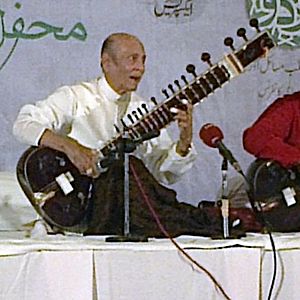Rais Khan facts for kids
Quick facts for kids
Ustad
Rais Khan
Pride of Performance, Sitara-i-Imtiaz
|
|
|---|---|

Khan performing in 2013
|
|
| Background information | |
| Native name |
استاد رئیس خان
|
| Born | 25 November 1939 Indore, Indore State, British India |
| Died | 6 May 2017 (aged 77) Karachi, Sindh, Pakistan |
| Genres | Hindustani classical music |
| Occupation(s) | Instrumentalist |
| Instruments | Sitar |
| Years active | 1948 – 2017 |
| Pride of Performance Recipient by the President of Pakistan in 2005 Sitara-i-Imtiaz (Crescent of Excellence) Award by the Government of Pakistan in 2017 |
|
|---|---|
| Presented by | Pervez Musharraf, President of Pakistan |
| Date | 2005 |
| Country | Pakistan |
Ustad Rais Khan (Urdu: رئیس خان; 25 November 1939 – 6 May 2017) was a famous sitarist from Pakistan. Many people thought he was one of the best sitar players ever. He kept performing music until he passed away. In 1986, he moved from India to Pakistan and became a Pakistani citizen. In 2017, he received the Sitara-i-Imtiaz (Crescent of Excellence) Award. This is Pakistan's third highest award for civilians.
Contents
Early Life and Family
Rais Khan was born on November 25, 1939, in Indore, which was part of British India. His family spoke Urdu and were Pashtun. He grew up in Bombay. He started learning music at a very young age. His first sitar was a small one made from a coconut shell!
In 1986, Rais Khan moved to Pakistan. He had married a Pakistani singer named Bilqees Khanum in 1979. They first met at a music event in Karachi. Rais Khan and Bilqees Khanum had two sons, Farhan Khan and Huzoor Hasnain Khan. Rais Khan had four sons in total: Sohail Khan, Cezanne Khan, Farhan Khan, and Huzoor Hasnain Khan.
His Musical Journey
Rais Khan came from the Mewati gharana, which is a special family tradition of classical music. This tradition is linked to the Indore gharana. His father, Mohammed Khan, was a rudra veena player and a sitarist. He taught Rais Khan a unique style of playing.
His family's music tradition goes back to the Mughal period. It produced many famous singers and instrumentalists. Rais Khan's mother was a singer, and his father played the veena. This mix helped him develop a special way of playing the sitar. His style combined elements of khyal (a popular vocal style), dhrupad (an older classical form), and thumri (a lyrical semi-classical form).
First Performances and World Tours
Rais Khan gave his first public concert at Sunderbai Hall. The Governor of Bombay, Sir Maharaja Singh, was there to watch him play. In 1955, Rais Khan was chosen to represent India at the International Youth Festival in Warsaw. Many countries took part in this event.
He also performed at the Kennedy Center in the United States. While in India, he played music for famous singers like Lata Mangeshkar, Mohammed Rafi, and Asha Bhosle. He worked with film composers like Madan Mohan, creating many popular songs. Rais Khan traveled all over the world to perform his music.
Unique Style and Collaborations
Rais Khan was also a singer. He was the first sitar player to record the hit song "Ghungroo Toot Gaye" for the BBC in London in 1978. He played it as an instrumental song on his sitar. He often sang and showed how to play compositions on the sitar.
Rais Khan sometimes performed with Bismillah Khan, a famous shehnai player. They played together in live concerts, like one at India Gate in New Delhi in 2001. After a break from performing, Rais Khan returned in the 1980s. He was invited by Ali Akbar Khan to perform in California.
Later Performances
Rais Khan sometimes performed with his son Farhan, who is also a sitarist. They played together on a TV show called Virsa- Heritage Revived in 2009. Tari Khan played the tabla with them. In 2012, Rais Khan performed at the Nehru Centre in Mumbai. In 2014, he performed "Hans Dhuni" and "Mein Sufi Hoon" with Abida Parveen on Coke Studio Pakistan.
His Legacy
Rais Khan passed away on May 6, 2017, in Karachi, at the age of 77. He had been ill for some time. After he died, the National Academy of Performing Arts (NAPA) held a special musical night to honor him.
Many people remembered his amazing talent. Urdu writer Anwar Maqsood said that "God had given him a rare gift." Indian singer Lata Mangeshkar called him "sitar ke jaadugar" (meaning "magician of sitar"). His son, Farhan Khan, continues his musical legacy as a sitarist.
Awards and Recognition
- Pride of Performance by the President of Pakistan in 2005.
- Sitara-i-Imtiaz (Star of Excellence) by the Government of Pakistan in 2017.

